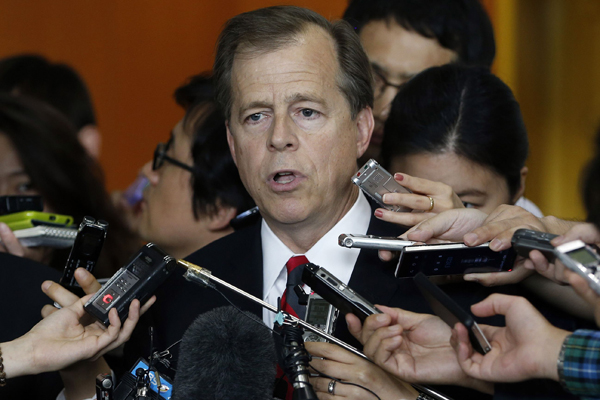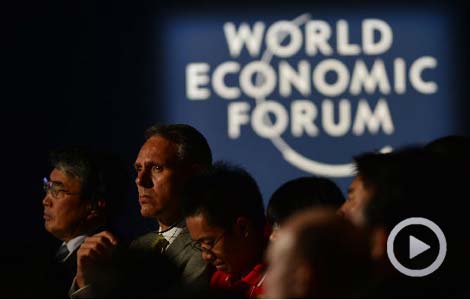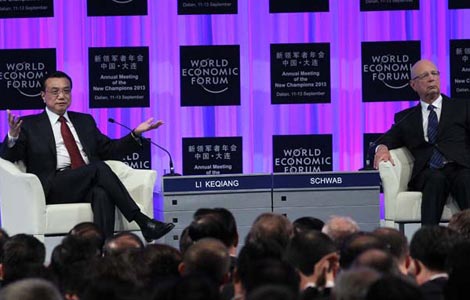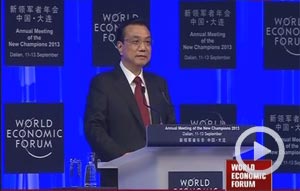Timetable not set for Six-Party Talks
Updated: 2013-09-11 01:29
By ZHOU WA and CHEN WEIHUA (China Daily)
|
||||||||
US envoy says conditions aren't right for meeting
As Beijing continues its efforts for an early resumption of the Six-Party Talks, Washington's top envoy on the Democratic People's Republic of Korea nuclear issue urged Pyongyang on Tuesday to take concrete steps toward denuclearization of the Korean Peninsula.
Glyn Davies, US special representative for DPRK policy, discussed the situation on the peninsula with his counterpart from the Republic of Korea, Cho Tae-yong, Yonhap News Agency reported.
 |
|
Glyn Davies, US special representative for DPRK policy |
"I don't think it's time yet, really, for the heads of the delegation of the six-party process to get together because I do not believe that we have the conditions," Davies was quoted by Yonhap as saying.
Davies arrived in the ROK on Monday and is scheduled to arrive in Beijing on Wednesday to meet his Chinese counterpart, Wu Dawei.
Chinese Foreign Ministry spokesman Hong Lei said on Tuesday that all parties should create conditions for the resumption of the Six-Party Talks and solve the DPRK nuclear issue within the framework of the talks.
China has always advocated the denuclearization of the Korean Peninsula, maintaining peace and stability on the peninsula and resolving the issue through political dialogue, Hong said.
In August, China proposed an informal meeting on Sept 18 among senior officials from countries involved in the Six-Party Talks, suspended since 2008, to discuss denuclearization of the peninsula.
As China's special envoy for Korean Peninsula affairs, Wu traveled to the DPRK on Aug 26 to 30 to talk with his counterpart Kim Kye-gwan. A media report said the DPRK agreed to send its nuclear envoy Ri Yong-ho to the proposed gathering.
Organized by the China Institute of International Studies, the so-called Track 1.5 meeting in Beijing is to review the past course of the Six-Party Talks.
The US, the ROK and Japan have not indicated whether or not they will send their chief nuclear negotiators to the informal meeting.
Davies' visit to East Asia is actually aimed at gathering information on the latest development on the Korean Peninsula, said Wang Junsheng, a researcher on East Asian studies at the Chinese Academy of Social Sciences.
Shi Yongming, a researcher on DPRK issues at the China Institute of International Studies, said he believes the US has not yet finalized its strategy toward Pyongyang.
"The US has not decided whether to discus the DPRK nuclear issue in multilateral talks or by bilateral communication with Pyongyang. Under present circumstances, a multilateral one is a wise choice for Washington," Shi said.
Meanwhile, the ROK and the US have recently mapped out a joint operation plan to deter and counteract the DPRK's nuclear program. The plan encompasses political, diplomatic and military measures that Washington will use to provide a nuclear umbrella for the ROK in case of a DPRK nuclear provocation.
While the plan is expected to be materialized by the US and the ROK in early October, Hong, the Foreign Ministry spokesman, called on Monday for all parties to keep the big picture in mind and do more to ease tensions.
"The US and the ROK lack trust in the DPRK, so they are preparing themselves for both eventualities," said Wang from the Chinese Academy of Social Sciences.
The plan with the military drills by the two countries is jeopardizing the hard-won easing situation on the peninsula, he added.
Contact the writers at chenweihua@chinadailyusa.com and zhouwa@chinadaily.com.cn

 Experts discuss Chinese premier's economic plan
Experts discuss Chinese premier's economic plan
 Voyager 1 has left solar system: NASA
Voyager 1 has left solar system: NASA
 Time of opportunities, challenges
Time of opportunities, challenges
 Plenty of fizz
Plenty of fizz
 Traffic about-face seeks to ease congestion
Traffic about-face seeks to ease congestion
 Another iPhone4 explodes while charging
Another iPhone4 explodes while charging
 Premier stresses transformation of the economy
Premier stresses transformation of the economy
 Soyuz capsule returns from space station
Soyuz capsule returns from space station
Most Viewed
Editor's Picks

|

|

|

|

|

|
Today's Top News
WB head to discuss climate in China visit
US moves against China firms criticized
3 sentenced to death for Xinjiang terror attack
Xi welcomes talks on Iran
Assad agrees to hand over chemical weapons
Time of opportunities, challenges
China sets caps for rare earths exploration
Ending non-tariff barriers benefits global economy
US Weekly

|

|





